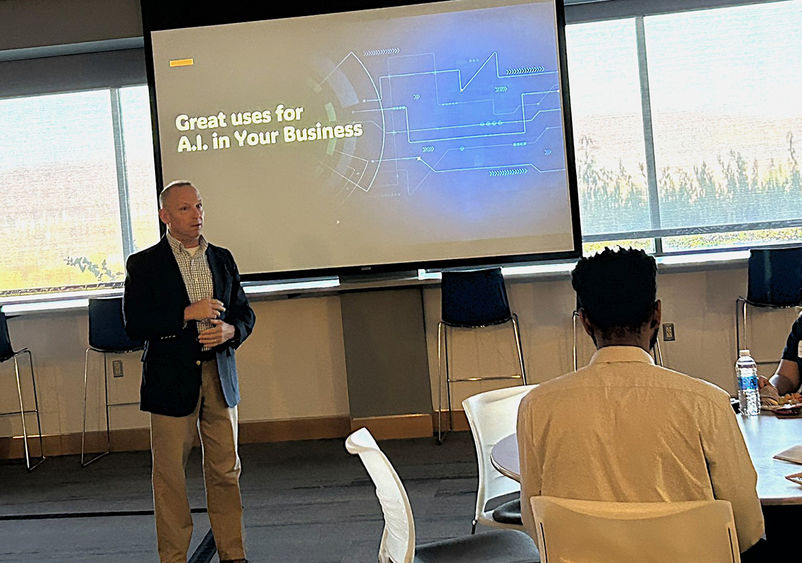
Fred Aebli, lecturer of information sciences and technology at Penn State Scranton and creator of GetMeCoding, which teaches computer coding, was the guest speaker for the Family Business Alliance’s (FBA) recent informational program on artificial intelligence (AI) and what it means for employees and businesses. The presentation, “Great Uses of AI in Your Business”, was part of the FBA’s slate of fall offerings.
DUNMORE, Pa. — Fred Aebli, lecturer of information sciences and technology at Penn State Scranton and creator of GetMeCoding, which teaches computer coding, was the guest speaker for the Family Business Alliance’s (FBA) recent informational program on artificial intelligence (AI) and what it means for employees and businesses. The presentation, “Great Uses of AI in Your Business”, was part of the FBA’s slate of fall offerings.
“Current AI trends are changing fast,” Aebli said. “Even experts are confused about where this is going.”
For most, AI really first came into people's everyday lives in 2007 with the iPhone, Wi-Fi access and the creation of high-speed networks, he explained.
However, in the past five years, there has been a huge expansion of AI and its capabilities, according to a timeline Aebli shared with the group:
- 2018 – Generative Pre-Trained Transformers (GPT) launches
- 2019 – GPT2 launches, with coherent paragraph-generation capabilities
- 2020 – GPT 3 comes into existence, and is highly coherent
- 2022 – GPT 3.5 has fine-tuned features through reinforced learning and the ability to create essays, compose music, answer test questions, emulate some computer operating systems and play simple games
- 2023 – GPT 4 understands complex tasks, images and longer content
This rapid growth is evident in the amount and kinds of technology seen and used today, Aebli said. Things such as Smart Cars, chatbots, Siri, retailers such as Amazon that use it to gauge customers interests/needs — all of these are leaps and bounds ahead of the capabilities of the earliest AI creations.
Despite this rapid growth and use, Aebli said he believes there are negatives associated with it and that at some point, AI will hit a wall because GPT has limitations due to the fact that it is not set up to learn in the way the human brain does.
AI can only generate information and ideas from the past, based on existing content it can find. It cannot look forward to project and analyze things in the way human beings can. And some of the information that it may find and use may not always be accurate.
AI is also causing massive disruptions in terms of legal issues, energy consumption, and regulation and ethical concerns, according to Aebli.
There have been intellectual property lawsuits, with AI-generated content sparking debates on ownership and copyright infringement; the environmental impact from the high energy demands of both the needs of computational power for training large AI models and the cooling costs for data centers — both of which increase the carbon footprint; and governments and organizations trying to keep up with rapid AI advancements in terms of legal and ethical areas. There is also the issue of AI misuse, with some using AI in surveillance, deep fakes and generating misinformation.
Educators are also facing challenges, Aebli said. As students’ use of AI increases, it may necessitate a change in teaching and learning, with more oversight and awareness by instructors required, as well as thinking of creative ways to implement AI into the classroom and the learning process.
It is Aebli’s belief that it is actually education that holds the key to effectively managing AI going forward.
“Education will be what lifts us up as a society,” he said.
There are also exciting and advantageous uses both for consumers and businesses, particularly in health care, where AI can aid in drug discovery and patient care; finance, where it assists in algorithmic trading, fraud detection and risk assessment; and customer service areas, where chatbots can efficiently handle inquiries.
Also on the positive side, Aebli said, is that AI is also creating new jobs, despite having reduced some functions previously done by people. There has been rapid growth in AI job postings across industries, he said, with high demand for roles like data scientists and machine learning engineers that offer competitive salaries and promising career prospects.
The key is to look at and utilize AI as a tool for augmentation, not replacement. It should be used to enhance human capabilities rather than replacing jobs.—Fred Aebli , lecturer of information sciences and technology at Penn State Scranton and creator of GetMeCoding
Essentially, AI can make workers more efficient by automating routine tasks, allowing them to focus on high-value activities, according to Abeli. It can also support creative and complex decision making processes by enhancing creativity — not replacing it — and providing new insights that allowing workers to experiment with ideas faster.
“Fred Abeli gave a clear, engaging and thought provoking presentation on AI," said Susan Reilly, executive director of FBA, who helped organize the event. "As smaller firms are being stretched to do more with less, AI offers significant benefits. Fred helped to discern best practices while inspiring the attendees to embrace the future and be creative on the possibilities of its use.”
The Family Business Alliance enables privately-held and family-owned businesses to realize their full potential by offering assistance via training, knowledge exchanges and access to special resources, while providing a supportive growth platform with the unique collaboration of members and sponsors.





